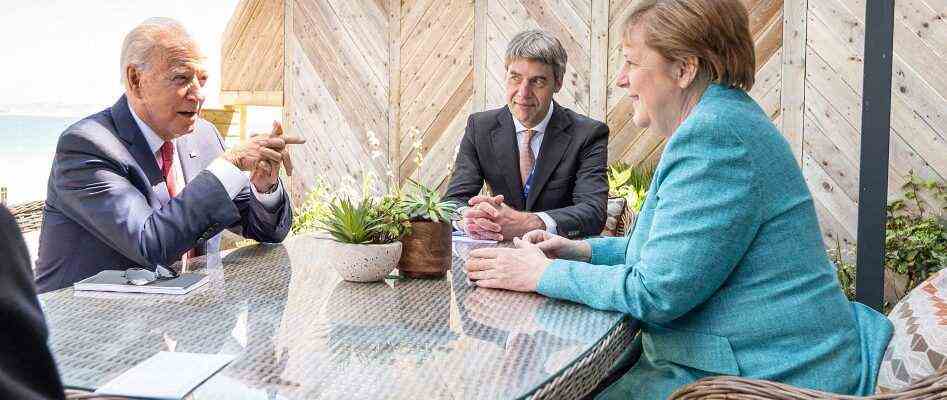When Angela Merkel travels these days, which no longer happens often, there are always two companions at her side. One is caution. The Chancellor continues to take the corona dangers seriously, which complicates all processes. The other companion is the burden of the story. After 16 years, the globally respected head of government is nearing the end of her term of office, which can lead to the political core of her business trips being obscured by emotions.
In this respect, it is significant what words Jen Psaki, the spokeswoman for US President Joe Biden, sent ahead of Merkel’s reception in the White House this Thursday. It is a “forward-looking visit,” she emphasizes. So there is no hint of goodbye. Merkel’s visit is about unfinished businessto unfinished business that should be clarified with Merkel if possible.
At the top of the list is Nord Stream 2. The president still considers the German-Russian gas pipeline to be a “bad deal,” says Psaki, and of course that will be “part of the discussion”. The dispute over the tube is one of the things that have become even more complicated for Merkel when the Democrat Biden took office. The relationship with Donald Trump was shattered anyway. Biden, on the other hand, is looking for a partner in Germany; Nord Stream 2 makes this new beginning difficult. Washington and Berlin have been negotiating for weeks how the problem can be gotten out of the way – if possible until Merkel visits the White House.
She does not believe that there will be an agreement by the time she visits Washington, but Merkel is dampening expectations on Monday evening. “We are right in the middle of it,” she says before talking to Ukrainian President Volodimir Zelensky, who hardly happened to come to Berlin shortly before her trip to the USA. Ukraine fears that Nord Stream 2 will make it superfluous for gas transit, which would lead to significant revenue losses and further weaken the country strategically vis-à-vis Russia. “Nord Stream 2 poses a potential threat to the security of Ukraine and the region”, affirmed Zelensky – and he is demanding guarantees “from the European Union, Germany and France”.
Ukraine expects guarantees from Germany
Germany takes the Ukrainian concerns seriously and will do everything in its power to “make it very clear that Nord Stream 2 is no substitute for the promised transit deliveries through Ukraine,” assured Merkel. For Germany it is “very clear and also important that Ukraine remains a gas transit country”. Merkel refers to a Russian-Ukrainian transit contract, which was also extended to the end of 2024 at her instigation and should continue to run until 2034 if possible. Germany will enforce this, “also for the future,” she says. “We promised Ukraine that, and we will keep to it,” assured the Chancellor – and she probably suspects what is going through her guest’s head. “I keep my promises,” she says, “and that also applies to every other German Chancellor.”
Zelensky would like it to be more specific. Ever since the annexation of Crimea and the war in eastern Ukraine, Ukraine has not believed in Russia’s loyalty to the treaty. She feels confirmed by the latest statements by Kremlin chief Vladimir Putin that Ukraine must show “good will” if it wants to remain a transit country for Russian gas over the long term.
However, the idea of stepping in with compensation when Russian transit fees are canceled has met with little enthusiasm in the federal government. Before Merkel’s trip to Washington, it was also unclear whether Nord Stream 2 could be equipped with a “kill switch” – a political emergency shutdown device in the event that Russia drains the Ukrainian pipeline.
CDU Chancellor candidate Armin Laschet and his SPD competitor Olaf Scholz recently gave the impression that this was practically a done deal. You can stop the line “at any time, even when the pipeline is ready, because then the business basis is gone,” said Laschet in a candidate triad at the Munich Security Conference. Finance Minister Scholz joined in.
Maas celebrates “new transatlantic beginning”
But Scholz also made it clear what the federal government actually had in mind, namely to help Ukraine as an energy supplier in the production of hydrogen. In addition, Germany is involved in the Three Seas Initiative of Central and Eastern European countries to promote infrastructure projects in the region. Last week, Foreign Minister Heiko Maas (SPD) attended a summit meeting of the initiative and raved about a “new transatlantic beginning”.
Meanwhile, the operating company of Nord Stream creates 2 facts. “We assume that the construction work will be finished by the end of August,” said their boss Matthias Warnig Handelsblatt. According to the Ministry of Economic Affairs, the technical acceptance is already underway.
Biden shouldn’t be surprised. He and his Foreign Minister Antony Blinken have assumed for a long time that they will not be able to prevent the completion of Nord Stream 2, which is why they are initially foregoing direct sanctions against society. For this, however, they expect something in return. Biden will want to talk to Merkel about a tougher stance towards China, possibly also about the approval of corona vaccines. And Merkel should of course also be celebrated. She receives an honorary doctorate from Johns Hopkins University. It’s her eighteenth.

